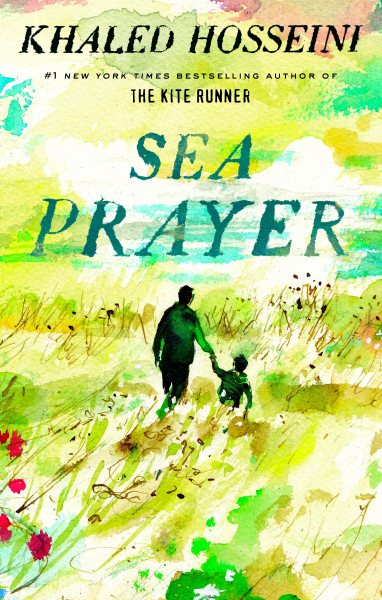Khaled Hosseini writes beautiful books. My favorite is (was?) A Thousand Splendid Suns, a heart-wrenching, lush novel that follows two generations of Afghan women beginning from before the Soviet invasion and to after their ouster and the rise of the Taliban. One of my favorite aspects of Suns is that it’s a 700+ page book that doesn’t read like an endless tome. The writing is rapid and fluid, with equal attention given to plot, detail, and character.
 Hosseini’s newest book, Sea Prayer, is the exact opposite, with one striking similarity. It’s short, airy, yet still strikingly beautiful. The writing is spare—the text is spread across 20 pages that are adorned with lovely watercolors by London-based illustrator Dan Williams—and stylistically, a departure from Hosseini’s typical dense prose. Framed as a letter from a fictitious father (i.e., not Hosseini) to his son, Sea Prayer explains why the family had to flee Homs, Syria, during the son’s toddler years. But before documenting the strife and violence, the narrator describes a Syria vastly different from the one we all know now. It was a “bustling” place with “a mosque for us Muslims, a church for our Christian neighbors,” a vibrant market filled with sounds and wonder, a home filled with family and peace.
Hosseini’s newest book, Sea Prayer, is the exact opposite, with one striking similarity. It’s short, airy, yet still strikingly beautiful. The writing is spare—the text is spread across 20 pages that are adorned with lovely watercolors by London-based illustrator Dan Williams—and stylistically, a departure from Hosseini’s typical dense prose. Framed as a letter from a fictitious father (i.e., not Hosseini) to his son, Sea Prayer explains why the family had to flee Homs, Syria, during the son’s toddler years. But before documenting the strife and violence, the narrator describes a Syria vastly different from the one we all know now. It was a “bustling” place with “a mosque for us Muslims, a church for our Christian neighbors,” a vibrant market filled with sounds and wonder, a home filled with family and peace.
Then, things changed: protests; a siege; “The skies spitting bombs. Starvation. Burials.” This is the Homs that the narrator’s son has lived in as far as his young memory can stretch. Now, they live in a Syria from which, for their own lives’ protection, they must flee. So the narrator and his family find themselves waiting on the shore for a boat to spirit them away to someplace without bombs and burials. First, though, they must cross the sea, “how vast, how indifferent,” a thing against which the father finds himself entirely powerless—much like the monster the father is running from.
And it’s this running from that strikes me about Sea Prayer. It’s a reminder that when people run toward new countries, they are often running away from horror and murder, away from bombs and burials. They’re not invading so much as evading.
Hosseini’s narrator prays that the sea understands this, and I don’t think I’m too far off base in assuming that this is Hosseini’s prayer for us as well. Hosseini has stated that his inspiration for Sea Prayer came from the image of young Alan Kurdi, a three-year-old Syrian boy who drowned in the Mediterranean Sea as his family sought safety in Europe. The proceeds from Sea Prayer will go to various charities supporting refugee aid. In this, the book pulls a double duty: it affects both the world in which we live and the hearts of those who read it, much like a prayer should.
Signed first editions of Sea Prayer are currently available at Lemuria.


Comments are closed.